Regulatory Requirements Research and Compliance Report for Hospitality
VerifiedAdded on 2020/06/06
|9
|2243
|47
Report
AI Summary
This report analyzes the regulatory requirements for establishing a new Beach Cafe as part of a hotel's operation. It begins with an introduction and table of contents, followed by a discussion of licenses, risk management, and legal advice. The report is divided into three parts, with Part A outlining procedures and risk management, Part B detailing policies, food safety standards, licensing requirements, tax obligations, national employment standards, and WHS requirements, and Part C discussing compliance audits and their role in ensuring consistency. The report emphasizes the importance of adhering to food safety practices, securing appropriate licenses, understanding tax obligations, and complying with national employment standards and WHS regulations. It concludes with a discussion of compliance audits and the need for a dedicated compliance department to ensure adherence to up-to-date laws and regulations. The report includes references to various journals, books, and online resources to support its findings.
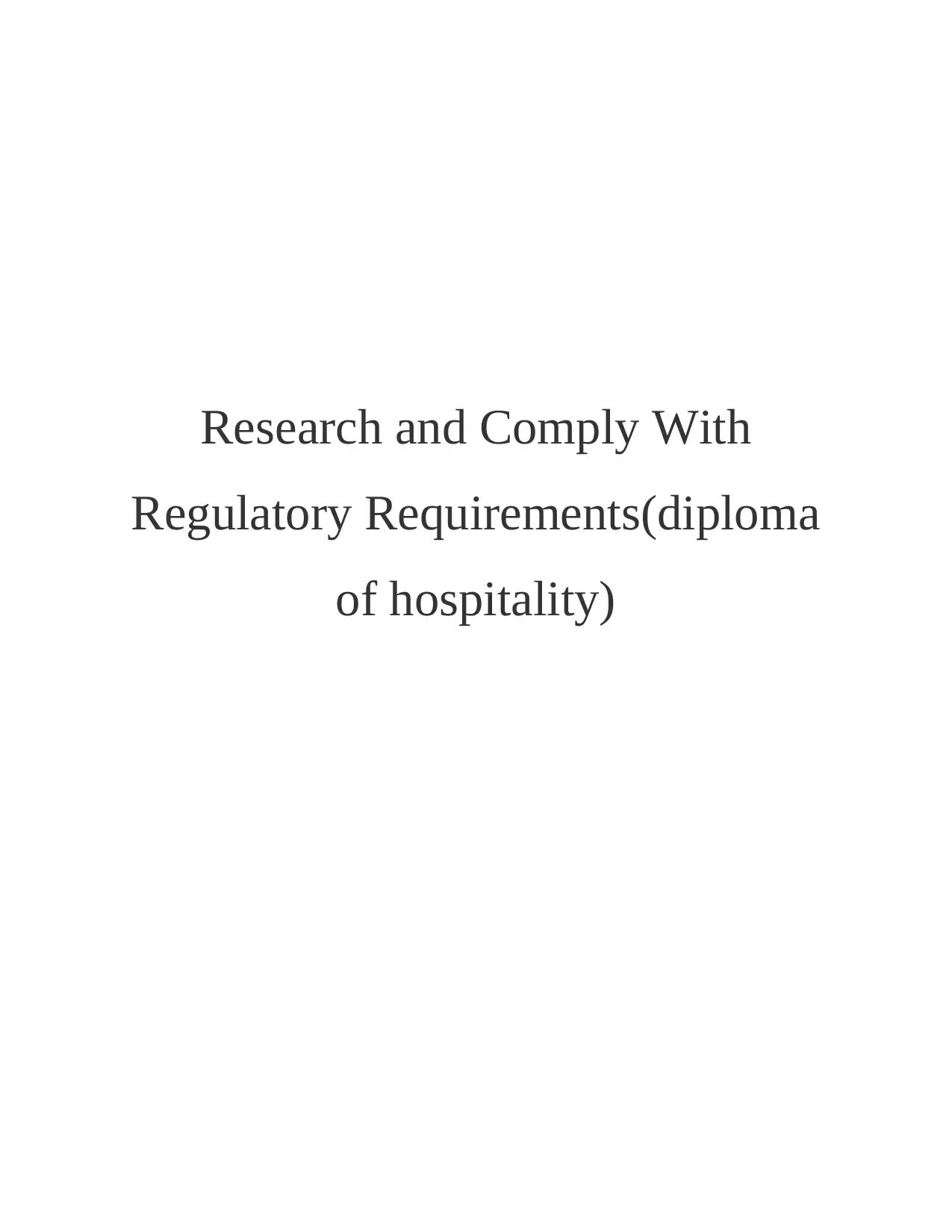
Research and Comply With
Regulatory Requirements(diploma
of hospitality)
Regulatory Requirements(diploma
of hospitality)
Paraphrase This Document
Need a fresh take? Get an instant paraphrase of this document with our AI Paraphraser
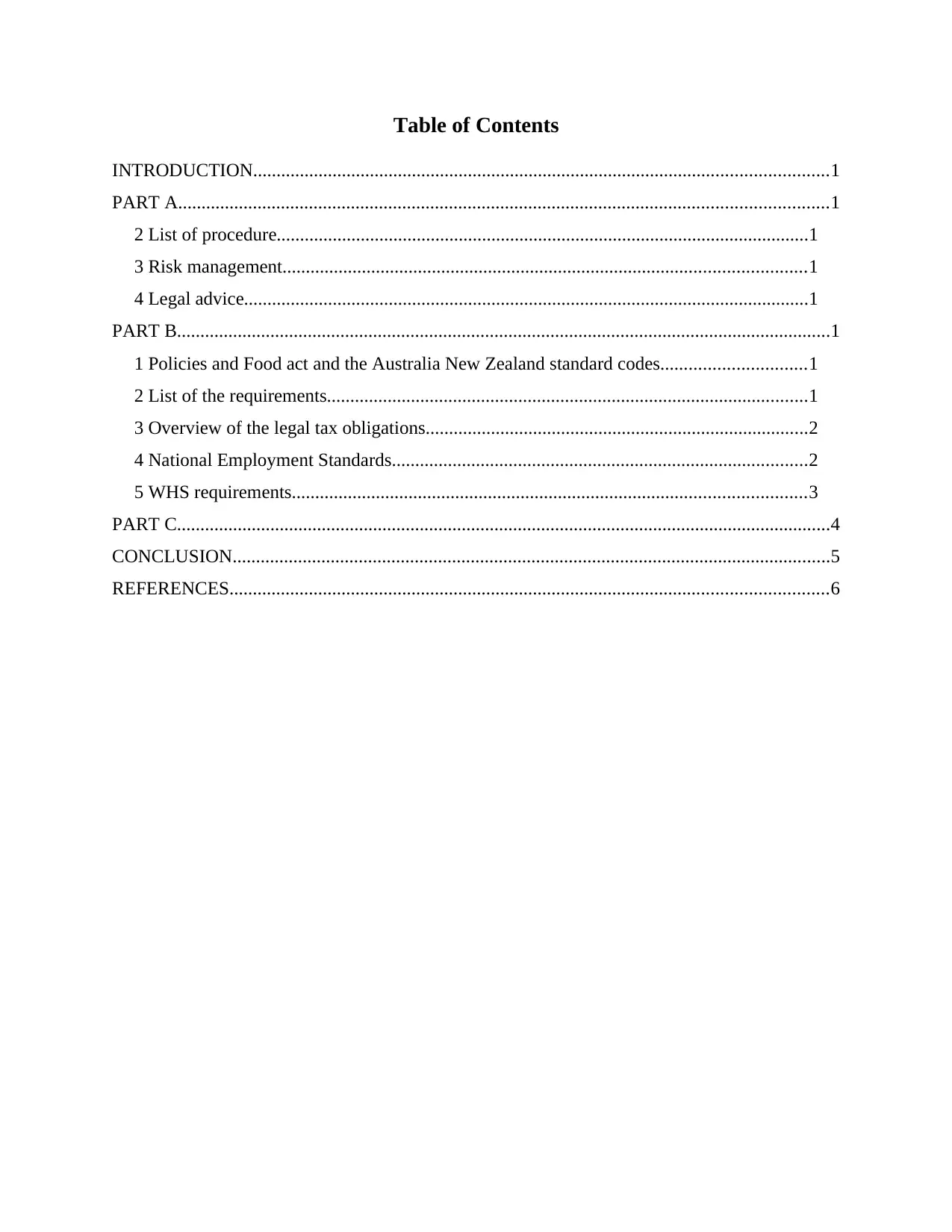
Table of Contents
INTRODUCTION...........................................................................................................................1
PART A...........................................................................................................................................1
2 List of procedure..................................................................................................................1
3 Risk management................................................................................................................1
4 Legal advice.........................................................................................................................1
PART B............................................................................................................................................1
1 Policies and Food act and the Australia New Zealand standard codes...............................1
2 List of the requirements.......................................................................................................1
3 Overview of the legal tax obligations..................................................................................2
4 National Employment Standards.........................................................................................2
5 WHS requirements..............................................................................................................3
PART C............................................................................................................................................4
CONCLUSION................................................................................................................................5
REFERENCES................................................................................................................................6
INTRODUCTION...........................................................................................................................1
PART A...........................................................................................................................................1
2 List of procedure..................................................................................................................1
3 Risk management................................................................................................................1
4 Legal advice.........................................................................................................................1
PART B............................................................................................................................................1
1 Policies and Food act and the Australia New Zealand standard codes...............................1
2 List of the requirements.......................................................................................................1
3 Overview of the legal tax obligations..................................................................................2
4 National Employment Standards.........................................................................................2
5 WHS requirements..............................................................................................................3
PART C............................................................................................................................................4
CONCLUSION................................................................................................................................5
REFERENCES................................................................................................................................6
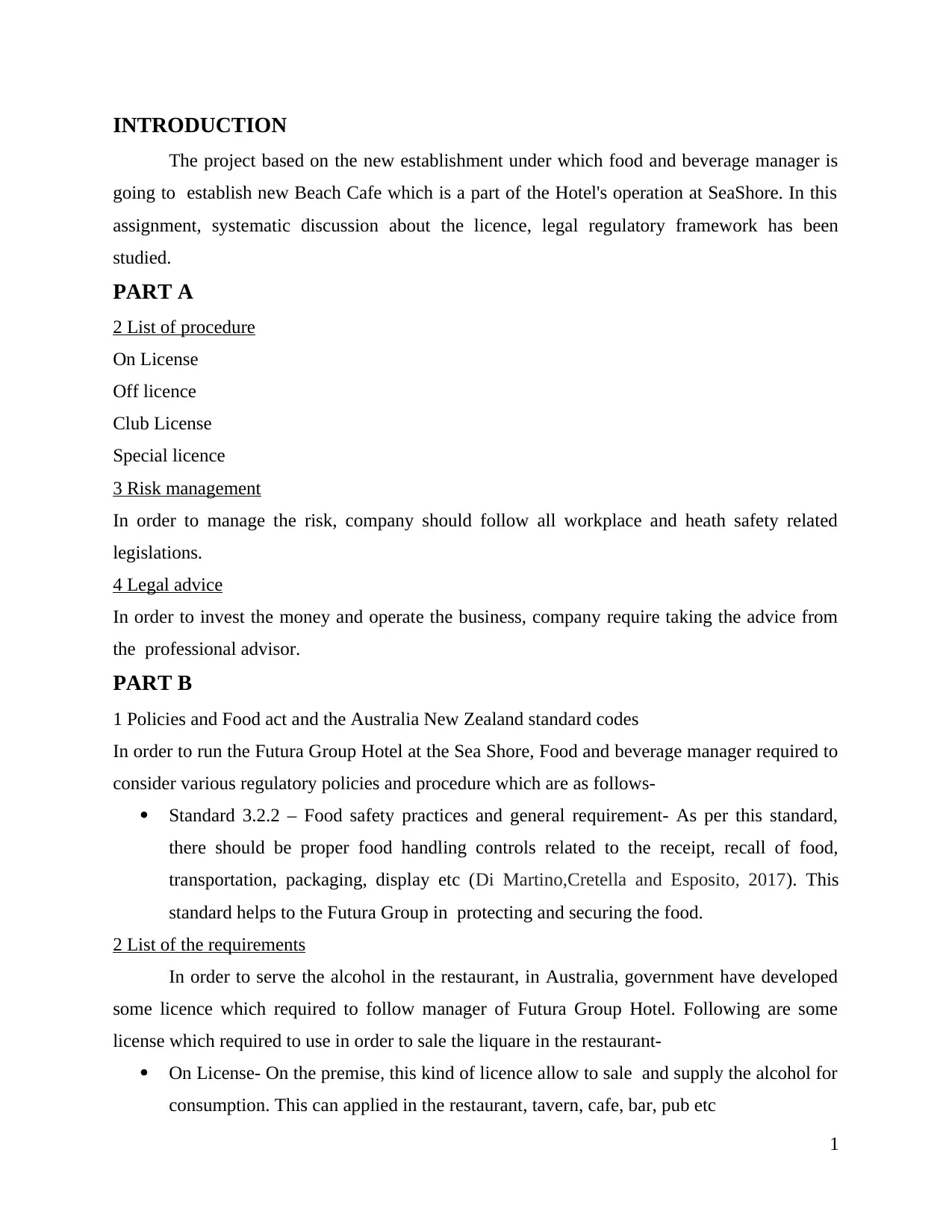
INTRODUCTION
The project based on the new establishment under which food and beverage manager is
going to establish new Beach Cafe which is a part of the Hotel's operation at SeaShore. In this
assignment, systematic discussion about the licence, legal regulatory framework has been
studied.
PART A
2 List of procedure
On License
Off licence
Club License
Special licence
3 Risk management
In order to manage the risk, company should follow all workplace and heath safety related
legislations.
4 Legal advice
In order to invest the money and operate the business, company require taking the advice from
the professional advisor.
PART B
1 Policies and Food act and the Australia New Zealand standard codes
In order to run the Futura Group Hotel at the Sea Shore, Food and beverage manager required to
consider various regulatory policies and procedure which are as follows-
Standard 3.2.2 – Food safety practices and general requirement- As per this standard,
there should be proper food handling controls related to the receipt, recall of food,
transportation, packaging, display etc (Di Martino,Cretella and Esposito, 2017). This
standard helps to the Futura Group in protecting and securing the food.
2 List of the requirements
In order to serve the alcohol in the restaurant, in Australia, government have developed
some licence which required to follow manager of Futura Group Hotel. Following are some
license which required to use in order to sale the liquare in the restaurant-
On License- On the premise, this kind of licence allow to sale and supply the alcohol for
consumption. This can applied in the restaurant, tavern, cafe, bar, pub etc
1
The project based on the new establishment under which food and beverage manager is
going to establish new Beach Cafe which is a part of the Hotel's operation at SeaShore. In this
assignment, systematic discussion about the licence, legal regulatory framework has been
studied.
PART A
2 List of procedure
On License
Off licence
Club License
Special licence
3 Risk management
In order to manage the risk, company should follow all workplace and heath safety related
legislations.
4 Legal advice
In order to invest the money and operate the business, company require taking the advice from
the professional advisor.
PART B
1 Policies and Food act and the Australia New Zealand standard codes
In order to run the Futura Group Hotel at the Sea Shore, Food and beverage manager required to
consider various regulatory policies and procedure which are as follows-
Standard 3.2.2 – Food safety practices and general requirement- As per this standard,
there should be proper food handling controls related to the receipt, recall of food,
transportation, packaging, display etc (Di Martino,Cretella and Esposito, 2017). This
standard helps to the Futura Group in protecting and securing the food.
2 List of the requirements
In order to serve the alcohol in the restaurant, in Australia, government have developed
some licence which required to follow manager of Futura Group Hotel. Following are some
license which required to use in order to sale the liquare in the restaurant-
On License- On the premise, this kind of licence allow to sale and supply the alcohol for
consumption. This can applied in the restaurant, tavern, cafe, bar, pub etc
1
⊘ This is a preview!⊘
Do you want full access?
Subscribe today to unlock all pages.

Trusted by 1+ million students worldwide
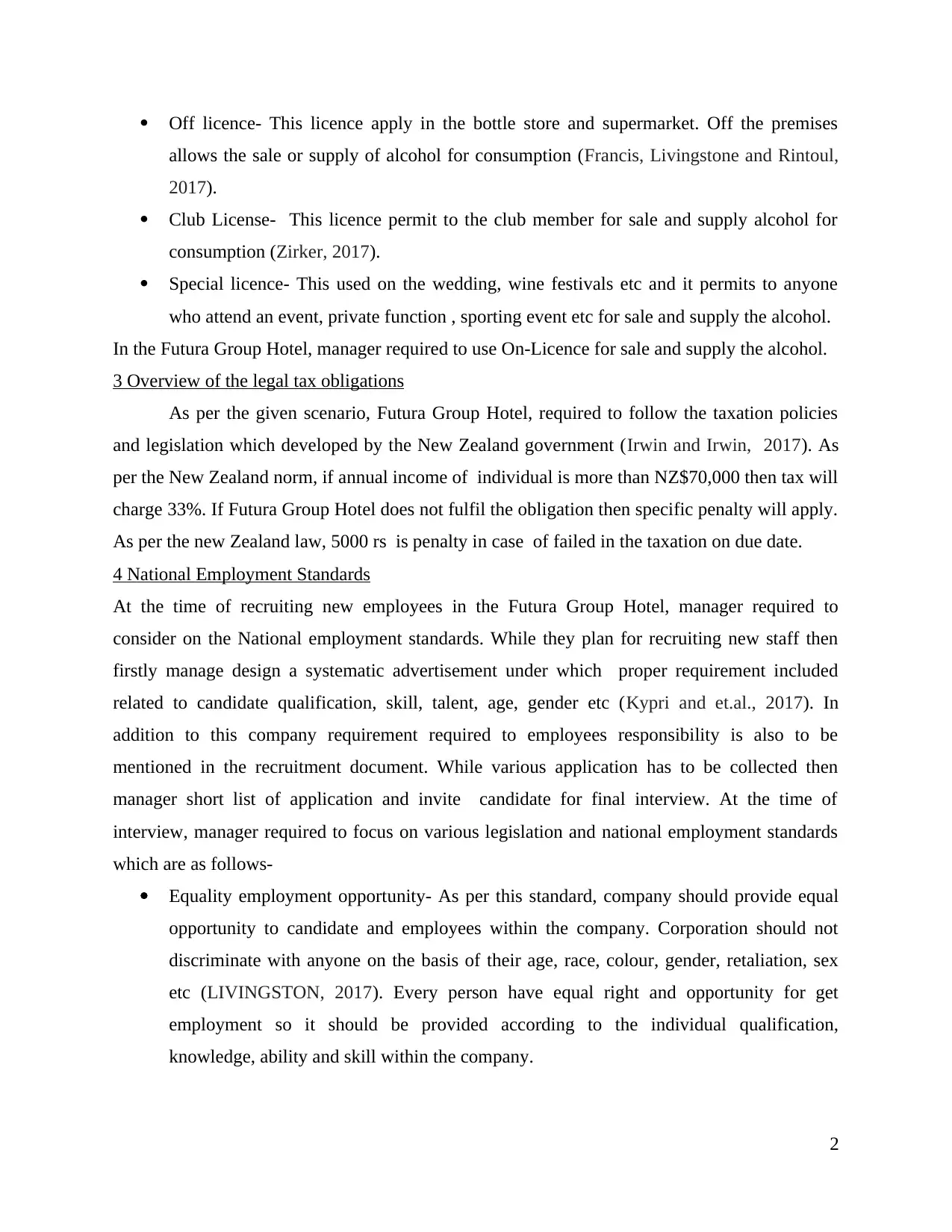
Off licence- This licence apply in the bottle store and supermarket. Off the premises
allows the sale or supply of alcohol for consumption (Francis, Livingstone and Rintoul,
2017).
Club License- This licence permit to the club member for sale and supply alcohol for
consumption (Zirker, 2017).
Special licence- This used on the wedding, wine festivals etc and it permits to anyone
who attend an event, private function , sporting event etc for sale and supply the alcohol.
In the Futura Group Hotel, manager required to use On-Licence for sale and supply the alcohol.
3 Overview of the legal tax obligations
As per the given scenario, Futura Group Hotel, required to follow the taxation policies
and legislation which developed by the New Zealand government (Irwin and Irwin, 2017). As
per the New Zealand norm, if annual income of individual is more than NZ$70,000 then tax will
charge 33%. If Futura Group Hotel does not fulfil the obligation then specific penalty will apply.
As per the new Zealand law, 5000 rs is penalty in case of failed in the taxation on due date.
4 National Employment Standards
At the time of recruiting new employees in the Futura Group Hotel, manager required to
consider on the National employment standards. While they plan for recruiting new staff then
firstly manage design a systematic advertisement under which proper requirement included
related to candidate qualification, skill, talent, age, gender etc (Kypri and et.al., 2017). In
addition to this company requirement required to employees responsibility is also to be
mentioned in the recruitment document. While various application has to be collected then
manager short list of application and invite candidate for final interview. At the time of
interview, manager required to focus on various legislation and national employment standards
which are as follows-
Equality employment opportunity- As per this standard, company should provide equal
opportunity to candidate and employees within the company. Corporation should not
discriminate with anyone on the basis of their age, race, colour, gender, retaliation, sex
etc (LIVINGSTON, 2017). Every person have equal right and opportunity for get
employment so it should be provided according to the individual qualification,
knowledge, ability and skill within the company.
2
allows the sale or supply of alcohol for consumption (Francis, Livingstone and Rintoul,
2017).
Club License- This licence permit to the club member for sale and supply alcohol for
consumption (Zirker, 2017).
Special licence- This used on the wedding, wine festivals etc and it permits to anyone
who attend an event, private function , sporting event etc for sale and supply the alcohol.
In the Futura Group Hotel, manager required to use On-Licence for sale and supply the alcohol.
3 Overview of the legal tax obligations
As per the given scenario, Futura Group Hotel, required to follow the taxation policies
and legislation which developed by the New Zealand government (Irwin and Irwin, 2017). As
per the New Zealand norm, if annual income of individual is more than NZ$70,000 then tax will
charge 33%. If Futura Group Hotel does not fulfil the obligation then specific penalty will apply.
As per the new Zealand law, 5000 rs is penalty in case of failed in the taxation on due date.
4 National Employment Standards
At the time of recruiting new employees in the Futura Group Hotel, manager required to
consider on the National employment standards. While they plan for recruiting new staff then
firstly manage design a systematic advertisement under which proper requirement included
related to candidate qualification, skill, talent, age, gender etc (Kypri and et.al., 2017). In
addition to this company requirement required to employees responsibility is also to be
mentioned in the recruitment document. While various application has to be collected then
manager short list of application and invite candidate for final interview. At the time of
interview, manager required to focus on various legislation and national employment standards
which are as follows-
Equality employment opportunity- As per this standard, company should provide equal
opportunity to candidate and employees within the company. Corporation should not
discriminate with anyone on the basis of their age, race, colour, gender, retaliation, sex
etc (LIVINGSTON, 2017). Every person have equal right and opportunity for get
employment so it should be provided according to the individual qualification,
knowledge, ability and skill within the company.
2
Paraphrase This Document
Need a fresh take? Get an instant paraphrase of this document with our AI Paraphraser
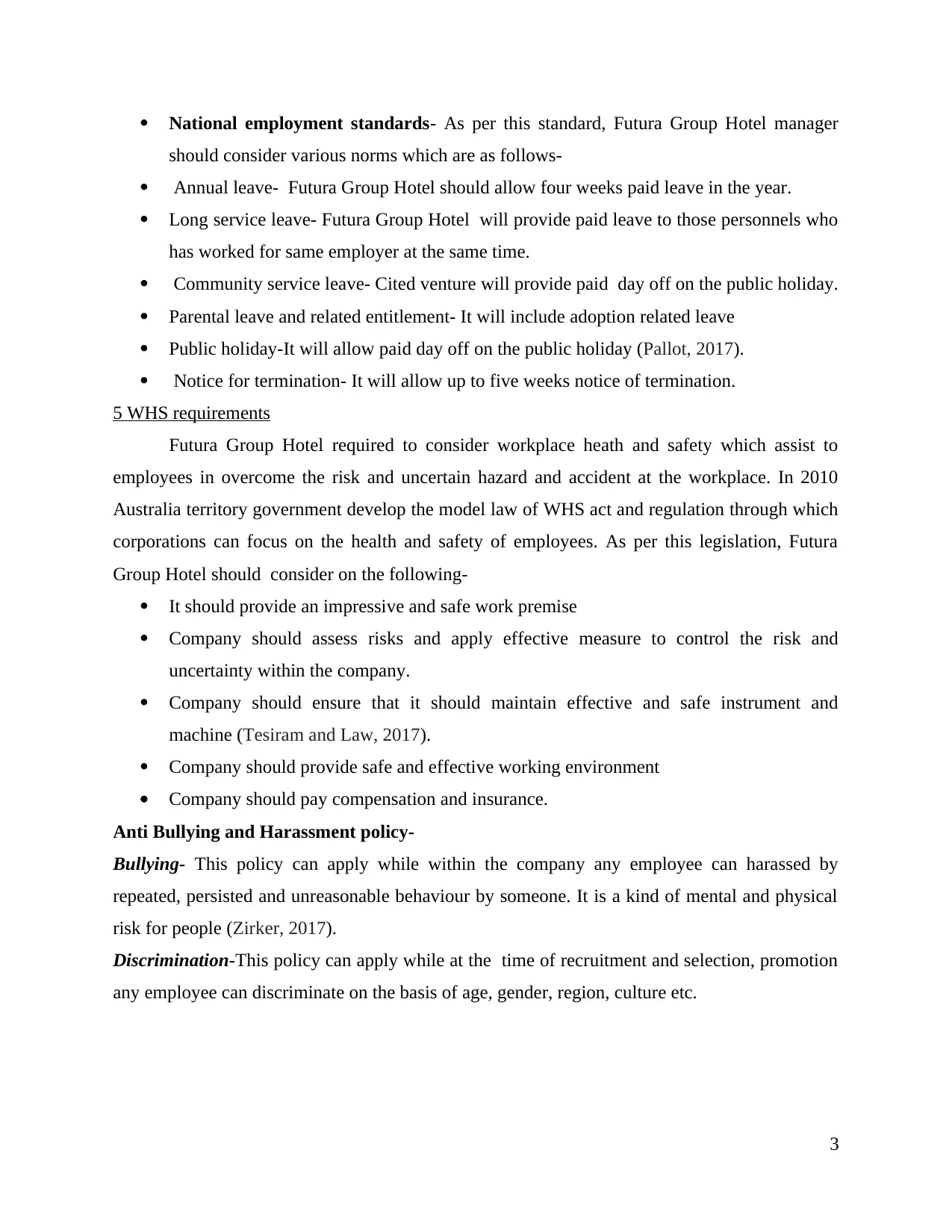
National employment standards- As per this standard, Futura Group Hotel manager
should consider various norms which are as follows-
Annual leave- Futura Group Hotel should allow four weeks paid leave in the year.
Long service leave- Futura Group Hotel will provide paid leave to those personnels who
has worked for same employer at the same time.
Community service leave- Cited venture will provide paid day off on the public holiday.
Parental leave and related entitlement- It will include adoption related leave
Public holiday-It will allow paid day off on the public holiday (Pallot, 2017).
Notice for termination- It will allow up to five weeks notice of termination.
5 WHS requirements
Futura Group Hotel required to consider workplace heath and safety which assist to
employees in overcome the risk and uncertain hazard and accident at the workplace. In 2010
Australia territory government develop the model law of WHS act and regulation through which
corporations can focus on the health and safety of employees. As per this legislation, Futura
Group Hotel should consider on the following-
It should provide an impressive and safe work premise
Company should assess risks and apply effective measure to control the risk and
uncertainty within the company.
Company should ensure that it should maintain effective and safe instrument and
machine (Tesiram and Law, 2017).
Company should provide safe and effective working environment
Company should pay compensation and insurance.
Anti Bullying and Harassment policy-
Bullying- This policy can apply while within the company any employee can harassed by
repeated, persisted and unreasonable behaviour by someone. It is a kind of mental and physical
risk for people (Zirker, 2017).
Discrimination-This policy can apply while at the time of recruitment and selection, promotion
any employee can discriminate on the basis of age, gender, region, culture etc.
3
should consider various norms which are as follows-
Annual leave- Futura Group Hotel should allow four weeks paid leave in the year.
Long service leave- Futura Group Hotel will provide paid leave to those personnels who
has worked for same employer at the same time.
Community service leave- Cited venture will provide paid day off on the public holiday.
Parental leave and related entitlement- It will include adoption related leave
Public holiday-It will allow paid day off on the public holiday (Pallot, 2017).
Notice for termination- It will allow up to five weeks notice of termination.
5 WHS requirements
Futura Group Hotel required to consider workplace heath and safety which assist to
employees in overcome the risk and uncertain hazard and accident at the workplace. In 2010
Australia territory government develop the model law of WHS act and regulation through which
corporations can focus on the health and safety of employees. As per this legislation, Futura
Group Hotel should consider on the following-
It should provide an impressive and safe work premise
Company should assess risks and apply effective measure to control the risk and
uncertainty within the company.
Company should ensure that it should maintain effective and safe instrument and
machine (Tesiram and Law, 2017).
Company should provide safe and effective working environment
Company should pay compensation and insurance.
Anti Bullying and Harassment policy-
Bullying- This policy can apply while within the company any employee can harassed by
repeated, persisted and unreasonable behaviour by someone. It is a kind of mental and physical
risk for people (Zirker, 2017).
Discrimination-This policy can apply while at the time of recruitment and selection, promotion
any employee can discriminate on the basis of age, gender, region, culture etc.
3
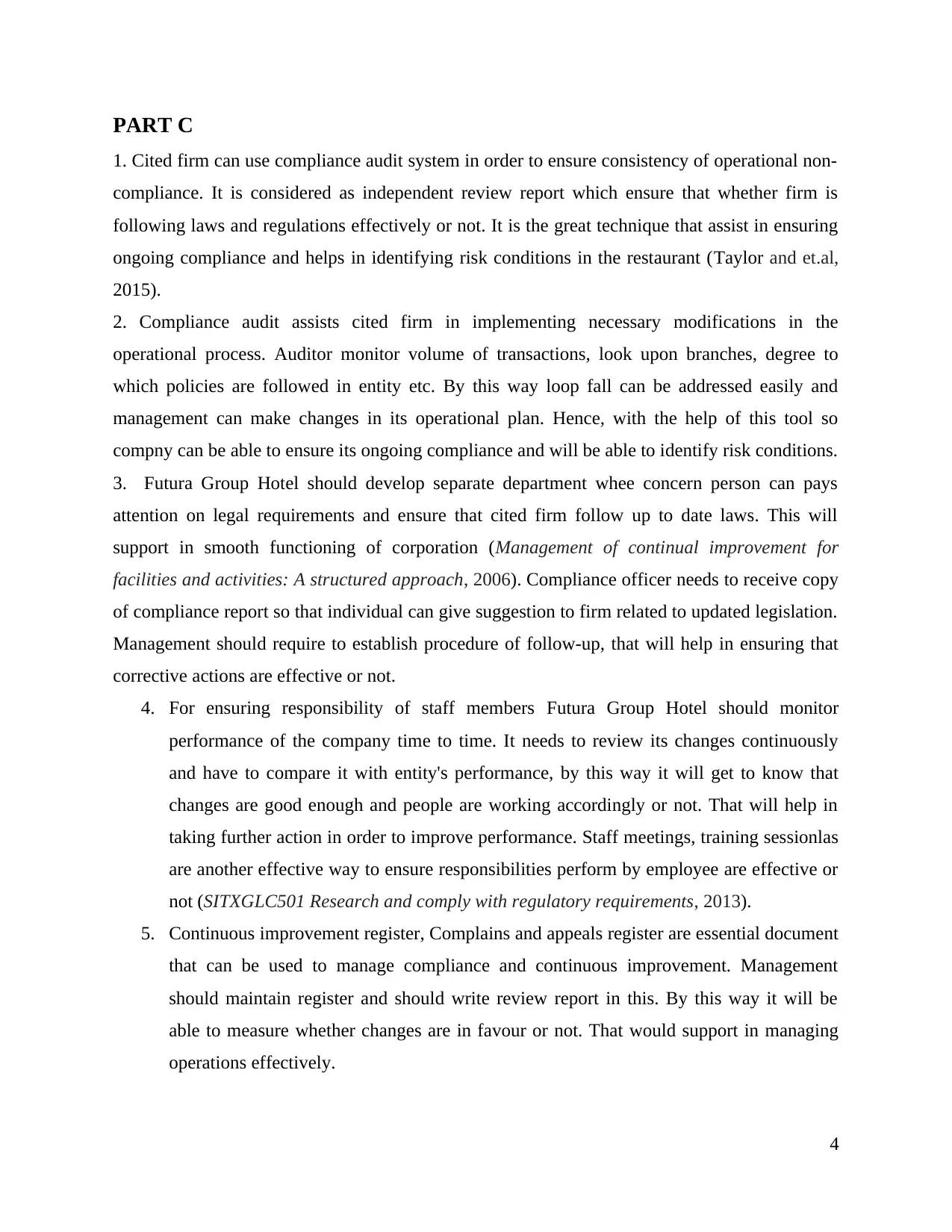
PART C
1. Cited firm can use compliance audit system in order to ensure consistency of operational non-
compliance. It is considered as independent review report which ensure that whether firm is
following laws and regulations effectively or not. It is the great technique that assist in ensuring
ongoing compliance and helps in identifying risk conditions in the restaurant (Taylor and et.al,
2015).
2. Compliance audit assists cited firm in implementing necessary modifications in the
operational process. Auditor monitor volume of transactions, look upon branches, degree to
which policies are followed in entity etc. By this way loop fall can be addressed easily and
management can make changes in its operational plan. Hence, with the help of this tool so
compny can be able to ensure its ongoing compliance and will be able to identify risk conditions.
3. Futura Group Hotel should develop separate department whee concern person can pays
attention on legal requirements and ensure that cited firm follow up to date laws. This will
support in smooth functioning of corporation (Management of continual improvement for
facilities and activities: A structured approach, 2006). Compliance officer needs to receive copy
of compliance report so that individual can give suggestion to firm related to updated legislation.
Management should require to establish procedure of follow-up, that will help in ensuring that
corrective actions are effective or not.
4. For ensuring responsibility of staff members Futura Group Hotel should monitor
performance of the company time to time. It needs to review its changes continuously
and have to compare it with entity's performance, by this way it will get to know that
changes are good enough and people are working accordingly or not. That will help in
taking further action in order to improve performance. Staff meetings, training sessionlas
are another effective way to ensure responsibilities perform by employee are effective or
not (SITXGLC501 Research and comply with regulatory requirements, 2013).
5. Continuous improvement register, Complains and appeals register are essential document
that can be used to manage compliance and continuous improvement. Management
should maintain register and should write review report in this. By this way it will be
able to measure whether changes are in favour or not. That would support in managing
operations effectively.
4
1. Cited firm can use compliance audit system in order to ensure consistency of operational non-
compliance. It is considered as independent review report which ensure that whether firm is
following laws and regulations effectively or not. It is the great technique that assist in ensuring
ongoing compliance and helps in identifying risk conditions in the restaurant (Taylor and et.al,
2015).
2. Compliance audit assists cited firm in implementing necessary modifications in the
operational process. Auditor monitor volume of transactions, look upon branches, degree to
which policies are followed in entity etc. By this way loop fall can be addressed easily and
management can make changes in its operational plan. Hence, with the help of this tool so
compny can be able to ensure its ongoing compliance and will be able to identify risk conditions.
3. Futura Group Hotel should develop separate department whee concern person can pays
attention on legal requirements and ensure that cited firm follow up to date laws. This will
support in smooth functioning of corporation (Management of continual improvement for
facilities and activities: A structured approach, 2006). Compliance officer needs to receive copy
of compliance report so that individual can give suggestion to firm related to updated legislation.
Management should require to establish procedure of follow-up, that will help in ensuring that
corrective actions are effective or not.
4. For ensuring responsibility of staff members Futura Group Hotel should monitor
performance of the company time to time. It needs to review its changes continuously
and have to compare it with entity's performance, by this way it will get to know that
changes are good enough and people are working accordingly or not. That will help in
taking further action in order to improve performance. Staff meetings, training sessionlas
are another effective way to ensure responsibilities perform by employee are effective or
not (SITXGLC501 Research and comply with regulatory requirements, 2013).
5. Continuous improvement register, Complains and appeals register are essential document
that can be used to manage compliance and continuous improvement. Management
should maintain register and should write review report in this. By this way it will be
able to measure whether changes are in favour or not. That would support in managing
operations effectively.
4
⊘ This is a preview!⊘
Do you want full access?
Subscribe today to unlock all pages.

Trusted by 1+ million students worldwide
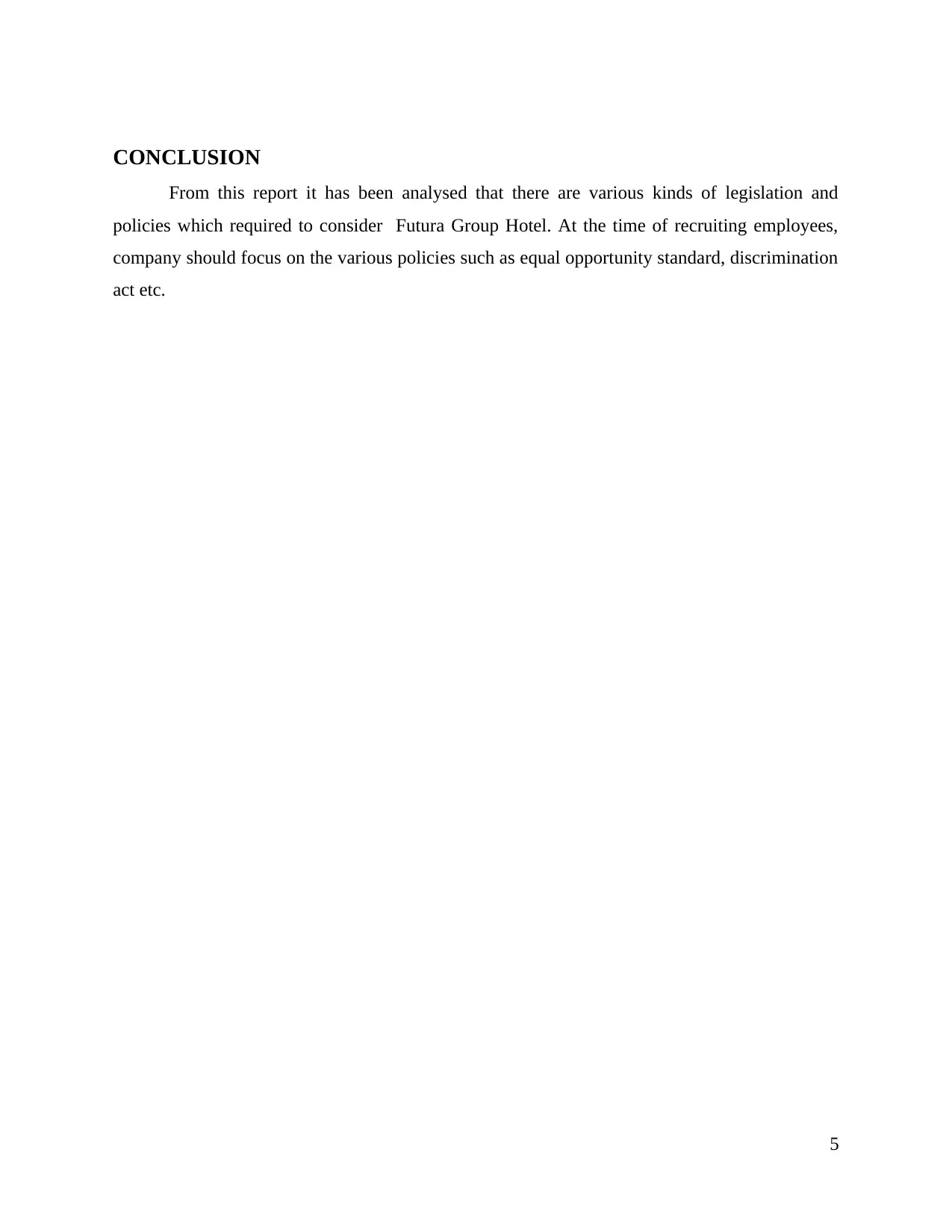
CONCLUSION
From this report it has been analysed that there are various kinds of legislation and
policies which required to consider Futura Group Hotel. At the time of recruiting employees,
company should focus on the various policies such as equal opportunity standard, discrimination
act etc.
5
From this report it has been analysed that there are various kinds of legislation and
policies which required to consider Futura Group Hotel. At the time of recruiting employees,
company should focus on the various policies such as equal opportunity standard, discrimination
act etc.
5
Paraphrase This Document
Need a fresh take? Get an instant paraphrase of this document with our AI Paraphraser
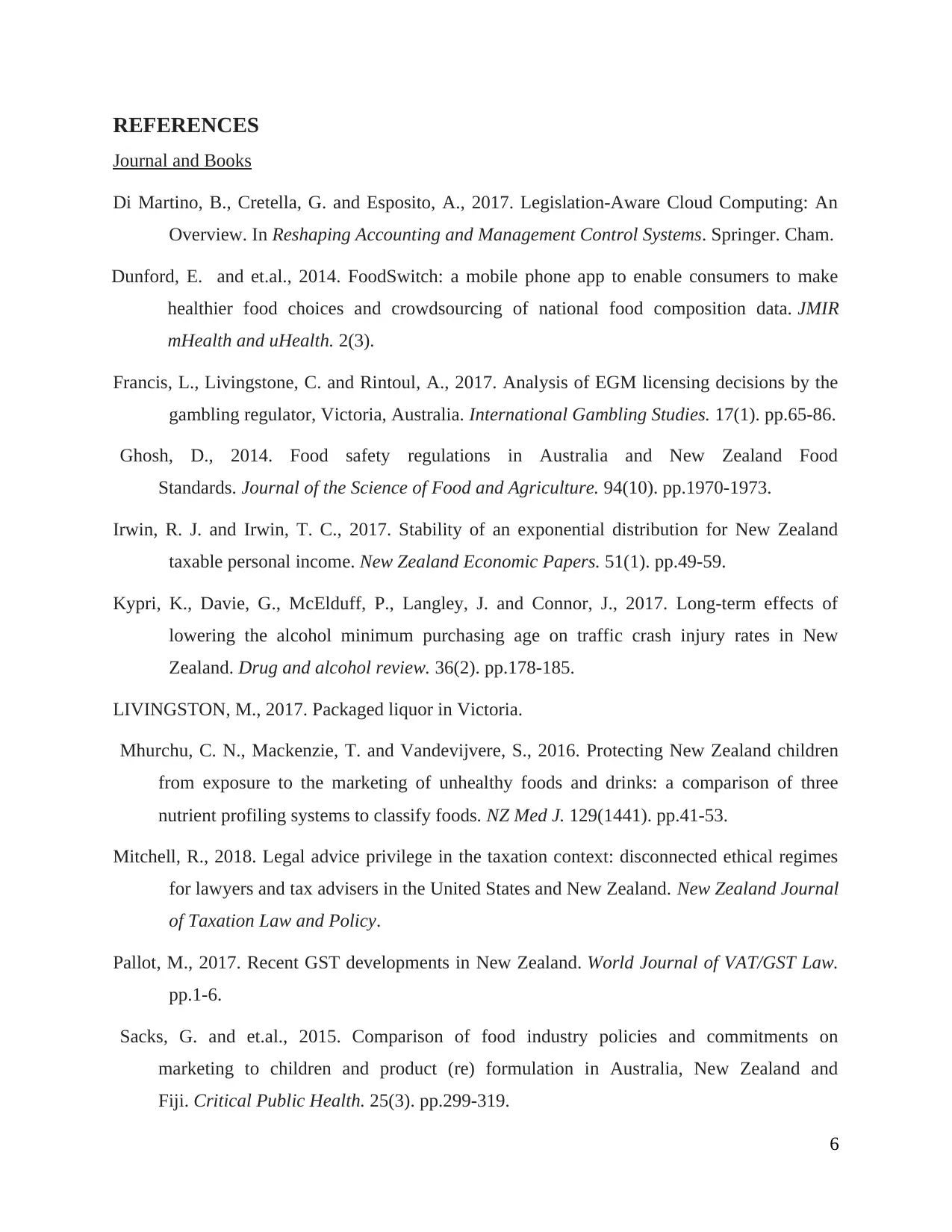
REFERENCES
Journal and Books
Di Martino, B., Cretella, G. and Esposito, A., 2017. Legislation-Aware Cloud Computing: An
Overview. In Reshaping Accounting and Management Control Systems. Springer. Cham.
Dunford, E. and et.al., 2014. FoodSwitch: a mobile phone app to enable consumers to make
healthier food choices and crowdsourcing of national food composition data. JMIR
mHealth and uHealth. 2(3).
Francis, L., Livingstone, C. and Rintoul, A., 2017. Analysis of EGM licensing decisions by the
gambling regulator, Victoria, Australia. International Gambling Studies. 17(1). pp.65-86.
Ghosh, D., 2014. Food safety regulations in Australia and New Zealand Food
Standards. Journal of the Science of Food and Agriculture. 94(10). pp.1970-1973.
Irwin, R. J. and Irwin, T. C., 2017. Stability of an exponential distribution for New Zealand
taxable personal income. New Zealand Economic Papers. 51(1). pp.49-59.
Kypri, K., Davie, G., McElduff, P., Langley, J. and Connor, J., 2017. Long‐term effects of
lowering the alcohol minimum purchasing age on traffic crash injury rates in New
Zealand. Drug and alcohol review. 36(2). pp.178-185.
LIVINGSTON, M., 2017. Packaged liquor in Victoria.
Mhurchu, C. N., Mackenzie, T. and Vandevijvere, S., 2016. Protecting New Zealand children
from exposure to the marketing of unhealthy foods and drinks: a comparison of three
nutrient profiling systems to classify foods. NZ Med J. 129(1441). pp.41-53.
Mitchell, R., 2018. Legal advice privilege in the taxation context: disconnected ethical regimes
for lawyers and tax advisers in the United States and New Zealand. New Zealand Journal
of Taxation Law and Policy.
Pallot, M., 2017. Recent GST developments in New Zealand. World Journal of VAT/GST Law.
pp.1-6.
Sacks, G. and et.al., 2015. Comparison of food industry policies and commitments on
marketing to children and product (re) formulation in Australia, New Zealand and
Fiji. Critical Public Health. 25(3). pp.299-319.
6
Journal and Books
Di Martino, B., Cretella, G. and Esposito, A., 2017. Legislation-Aware Cloud Computing: An
Overview. In Reshaping Accounting and Management Control Systems. Springer. Cham.
Dunford, E. and et.al., 2014. FoodSwitch: a mobile phone app to enable consumers to make
healthier food choices and crowdsourcing of national food composition data. JMIR
mHealth and uHealth. 2(3).
Francis, L., Livingstone, C. and Rintoul, A., 2017. Analysis of EGM licensing decisions by the
gambling regulator, Victoria, Australia. International Gambling Studies. 17(1). pp.65-86.
Ghosh, D., 2014. Food safety regulations in Australia and New Zealand Food
Standards. Journal of the Science of Food and Agriculture. 94(10). pp.1970-1973.
Irwin, R. J. and Irwin, T. C., 2017. Stability of an exponential distribution for New Zealand
taxable personal income. New Zealand Economic Papers. 51(1). pp.49-59.
Kypri, K., Davie, G., McElduff, P., Langley, J. and Connor, J., 2017. Long‐term effects of
lowering the alcohol minimum purchasing age on traffic crash injury rates in New
Zealand. Drug and alcohol review. 36(2). pp.178-185.
LIVINGSTON, M., 2017. Packaged liquor in Victoria.
Mhurchu, C. N., Mackenzie, T. and Vandevijvere, S., 2016. Protecting New Zealand children
from exposure to the marketing of unhealthy foods and drinks: a comparison of three
nutrient profiling systems to classify foods. NZ Med J. 129(1441). pp.41-53.
Mitchell, R., 2018. Legal advice privilege in the taxation context: disconnected ethical regimes
for lawyers and tax advisers in the United States and New Zealand. New Zealand Journal
of Taxation Law and Policy.
Pallot, M., 2017. Recent GST developments in New Zealand. World Journal of VAT/GST Law.
pp.1-6.
Sacks, G. and et.al., 2015. Comparison of food industry policies and commitments on
marketing to children and product (re) formulation in Australia, New Zealand and
Fiji. Critical Public Health. 25(3). pp.299-319.
6
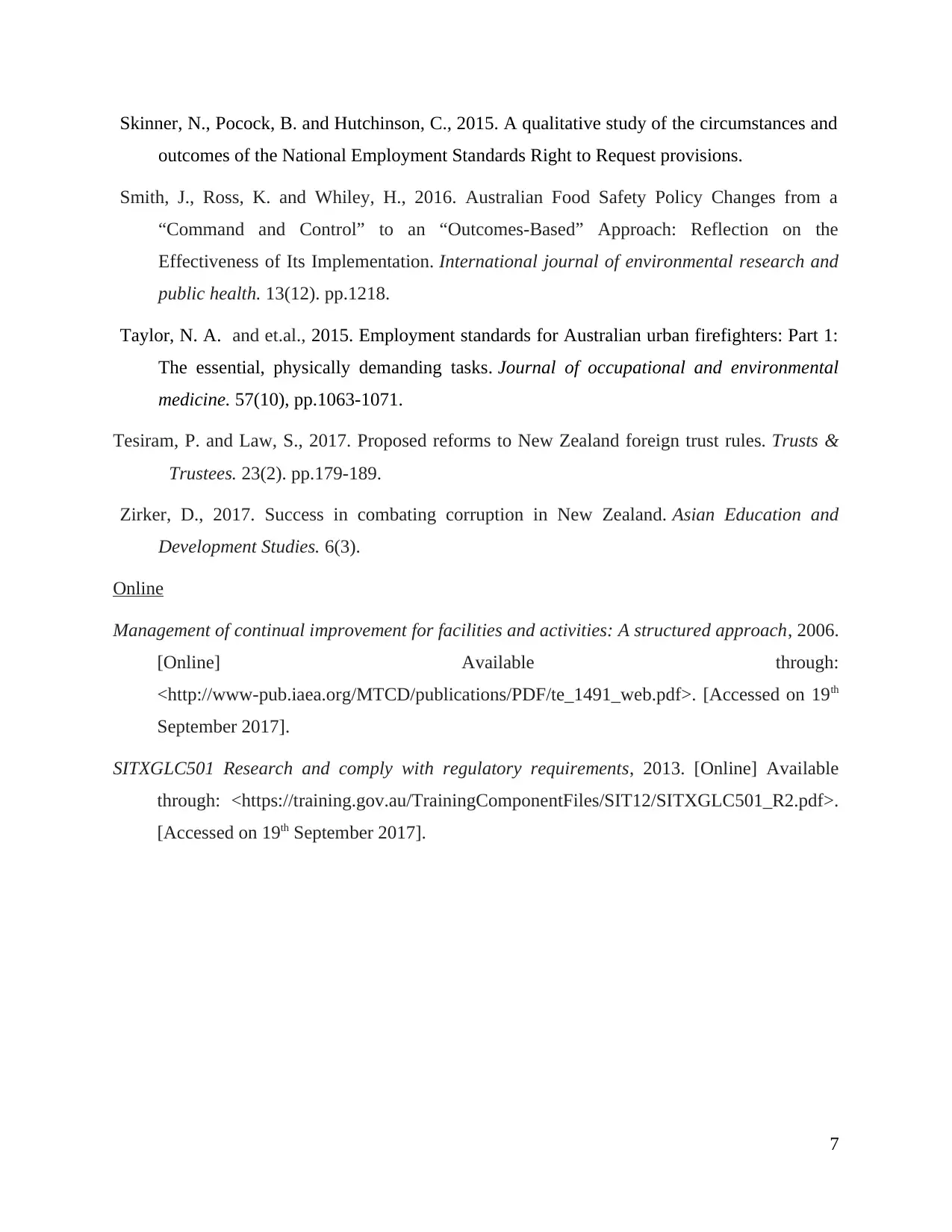
Skinner, N., Pocock, B. and Hutchinson, C., 2015. A qualitative study of the circumstances and
outcomes of the National Employment Standards Right to Request provisions.
Smith, J., Ross, K. and Whiley, H., 2016. Australian Food Safety Policy Changes from a
“Command and Control” to an “Outcomes-Based” Approach: Reflection on the
Effectiveness of Its Implementation. International journal of environmental research and
public health. 13(12). pp.1218.
Taylor, N. A. and et.al., 2015. Employment standards for Australian urban firefighters: Part 1:
The essential, physically demanding tasks. Journal of occupational and environmental
medicine. 57(10), pp.1063-1071.
Tesiram, P. and Law, S., 2017. Proposed reforms to New Zealand foreign trust rules. Trusts &
Trustees. 23(2). pp.179-189.
Zirker, D., 2017. Success in combating corruption in New Zealand. Asian Education and
Development Studies. 6(3).
Online
Management of continual improvement for facilities and activities: A structured approach, 2006.
[Online] Available through:
<http://www-pub.iaea.org/MTCD/publications/PDF/te_1491_web.pdf>. [Accessed on 19th
September 2017].
SITXGLC501 Research and comply with regulatory requirements, 2013. [Online] Available
through: <https://training.gov.au/TrainingComponentFiles/SIT12/SITXGLC501_R2.pdf>.
[Accessed on 19th September 2017].
7
outcomes of the National Employment Standards Right to Request provisions.
Smith, J., Ross, K. and Whiley, H., 2016. Australian Food Safety Policy Changes from a
“Command and Control” to an “Outcomes-Based” Approach: Reflection on the
Effectiveness of Its Implementation. International journal of environmental research and
public health. 13(12). pp.1218.
Taylor, N. A. and et.al., 2015. Employment standards for Australian urban firefighters: Part 1:
The essential, physically demanding tasks. Journal of occupational and environmental
medicine. 57(10), pp.1063-1071.
Tesiram, P. and Law, S., 2017. Proposed reforms to New Zealand foreign trust rules. Trusts &
Trustees. 23(2). pp.179-189.
Zirker, D., 2017. Success in combating corruption in New Zealand. Asian Education and
Development Studies. 6(3).
Online
Management of continual improvement for facilities and activities: A structured approach, 2006.
[Online] Available through:
<http://www-pub.iaea.org/MTCD/publications/PDF/te_1491_web.pdf>. [Accessed on 19th
September 2017].
SITXGLC501 Research and comply with regulatory requirements, 2013. [Online] Available
through: <https://training.gov.au/TrainingComponentFiles/SIT12/SITXGLC501_R2.pdf>.
[Accessed on 19th September 2017].
7
⊘ This is a preview!⊘
Do you want full access?
Subscribe today to unlock all pages.

Trusted by 1+ million students worldwide
1 out of 9
Related Documents
Your All-in-One AI-Powered Toolkit for Academic Success.
+13062052269
info@desklib.com
Available 24*7 on WhatsApp / Email
![[object Object]](/_next/static/media/star-bottom.7253800d.svg)
Unlock your academic potential
Copyright © 2020–2026 A2Z Services. All Rights Reserved. Developed and managed by ZUCOL.





